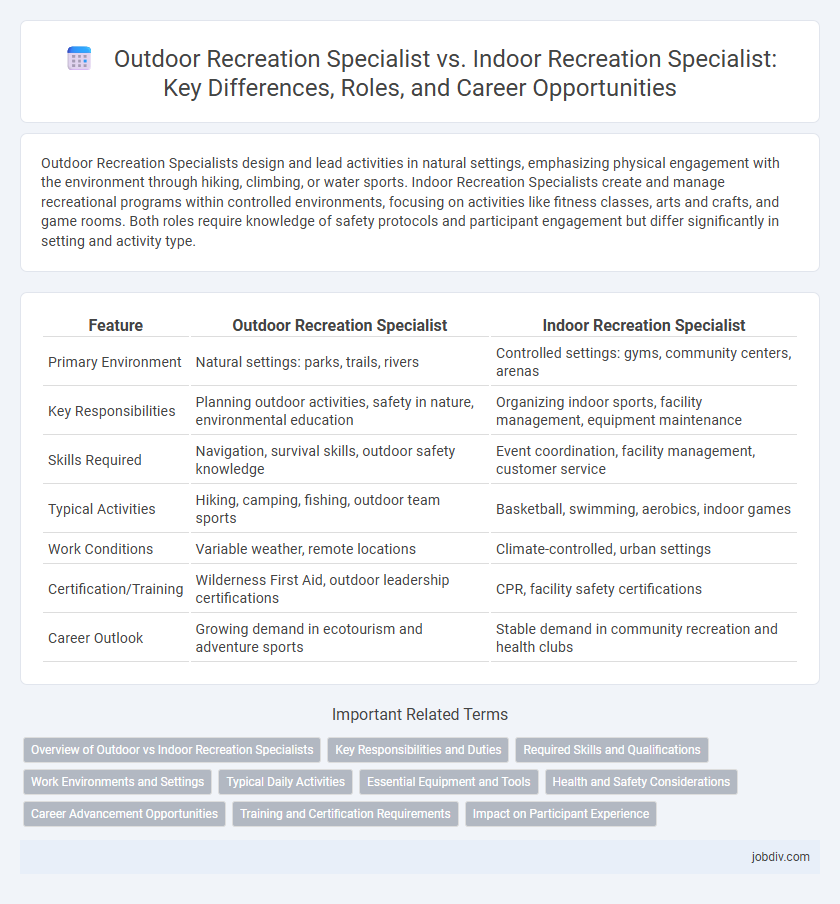Outdoor Recreation Specialists design and lead activities in natural settings, emphasizing physical engagement with the environment through hiking, climbing, or water sports. Indoor Recreation Specialists create and manage recreational programs within controlled environments, focusing on activities like fitness classes, arts and crafts, and game rooms. Both roles require knowledge of safety protocols and participant engagement but differ significantly in setting and activity type.
Table of Comparison
| Feature | Outdoor Recreation Specialist | Indoor Recreation Specialist |
|---|---|---|
| Primary Environment | Natural settings: parks, trails, rivers | Controlled settings: gyms, community centers, arenas |
| Key Responsibilities | Planning outdoor activities, safety in nature, environmental education | Organizing indoor sports, facility management, equipment maintenance |
| Skills Required | Navigation, survival skills, outdoor safety knowledge | Event coordination, facility management, customer service |
| Typical Activities | Hiking, camping, fishing, outdoor team sports | Basketball, swimming, aerobics, indoor games |
| Work Conditions | Variable weather, remote locations | Climate-controlled, urban settings |
| Certification/Training | Wilderness First Aid, outdoor leadership certifications | CPR, facility safety certifications |
| Career Outlook | Growing demand in ecotourism and adventure sports | Stable demand in community recreation and health clubs |
Overview of Outdoor vs Indoor Recreation Specialists
Outdoor Recreation Specialists design and manage activities like hiking, camping, and adventure sports, emphasizing natural environments and physical engagement. Indoor Recreation Specialists focus on organizing activities such as fitness programs, arts and crafts, and indoor sports within controlled environments like community centers or gyms. Both roles require expertise in program development, safety protocols, and participant engagement but differ primarily in setting and types of recreational experiences offered.
Key Responsibilities and Duties
Outdoor Recreation Specialists design and lead activities such as hiking, camping, and wildlife observation, ensuring participant safety and environmental conservation. They manage equipment, assess natural area conditions, and provide educational programs about outdoor skills and environmental stewardship. Indoor Recreation Specialists coordinate gymnasium activities, fitness classes, and arts or crafts programs, maintaining facility safety and promoting inclusive social interaction.
Required Skills and Qualifications
Outdoor Recreation Specialists require skills in wilderness navigation, environmental education, and physical endurance, alongside certifications in first aid and CPR. Indoor Recreation Specialists must possess expertise in facility management, program development for diverse age groups, and proficiency in safety regulations relevant to enclosed spaces. Both roles demand strong communication abilities, leadership qualities, and a background in recreational therapy or leisure studies.
Work Environments and Settings
Outdoor Recreation Specialists primarily work in natural settings such as national parks, forests, and recreation areas, focusing on activities like hiking, camping, and wildlife observation. Indoor Recreation Specialists operate in controlled environments including community centers, gyms, and sports complexes, managing activities such as fitness classes, indoor sports, and therapeutic recreation programs. Both roles require adapting programs to their specific environments while ensuring participant safety and engagement.
Typical Daily Activities
Outdoor Recreation Specialists typically plan and lead activities such as hiking, camping, and fishing, focusing on safety, environmental education, and equipment management in natural settings. Indoor Recreation Specialists organize gym games, fitness classes, and arts and crafts, managing recreation centers and ensuring participant engagement and safety within controlled environments. Both roles require risk assessment and program development tailored to their respective environments to enhance participant experience and well-being.
Essential Equipment and Tools
Outdoor Recreation Specialists rely heavily on essential equipment such as hiking gear, safety helmets, GPS devices, and portable first aid kits to ensure safety and enhance experiences in natural environments. Indoor Recreation Specialists utilize tools like fitness machines, audio-visual equipment, and specialized game setups to create engaging and controlled recreational activities. Both specialists prioritize maintenance and proper usage of their respective equipment to optimize participant safety and enjoyment.
Health and Safety Considerations
Outdoor Recreation Specialists prioritize health and safety by managing risks related to weather conditions, terrain hazards, and wildlife encounters, ensuring participants are equipped with appropriate gear and first aid knowledge. Indoor Recreation Specialists focus on preventing injuries through facility maintenance, enforcing equipment standards, and implementing emergency response protocols in controlled environments. Both roles require adherence to safety regulations and continuous risk assessments to promote participant well-being during recreational activities.
Career Advancement Opportunities
Outdoor Recreation Specialists often have broader career advancement opportunities due to the increasing demand for sustainable tourism, park management, and adventure programming, which requires specialized certifications and leadership skills. Indoor Recreation Specialists may advance in facility management, program coordination, and therapeutic recreation roles, leveraging expertise in community engagement and adaptive recreation technologies. Both pathways offer growth potential, but outdoor roles typically emphasize environmental stewardship and risk management, while indoor roles focus more on health, wellness, and inclusive programming.
Training and Certification Requirements
Outdoor Recreation Specialists typically require certifications such as Wilderness First Aid, CPR, and specific training in outdoor safety and environmental stewardship to effectively manage activities in natural settings. Indoor Recreation Specialists prioritize certifications in facility management, fitness instruction, and emergency response tailored to enclosed environments along with skills in program planning and participant engagement. Both roles demand ongoing education and compliance with safety standards to ensure high-quality, secure recreational experiences.
Impact on Participant Experience
Outdoor Recreation Specialists enhance participant experience by leveraging natural environments to promote physical activity, stress reduction, and environmental appreciation, leading to higher engagement and overall well-being. Indoor Recreation Specialists create controlled settings that offer accessible, year-round activities tailored to diverse interests and abilities, ensuring consistent participation and social interaction. Both roles significantly impact enjoyment and satisfaction by customizing programs to meet the specific needs and preferences of their participants.
Outdoor Recreation Specialist vs Indoor Recreation Specialist Infographic

 jobdiv.com
jobdiv.com